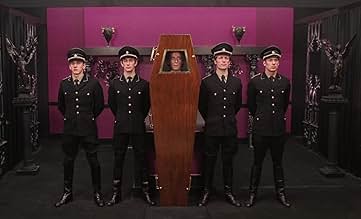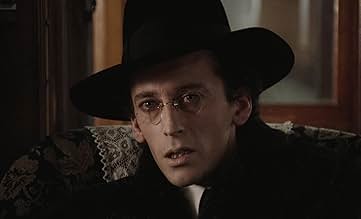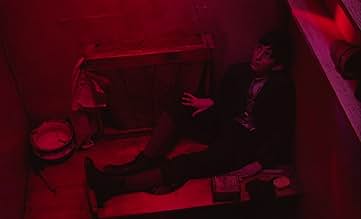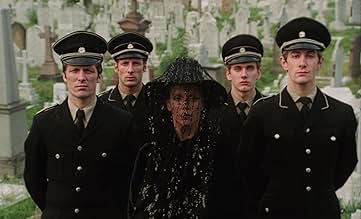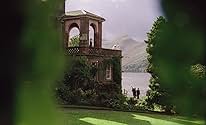CALIFICACIÓN DE IMDb
7.0/10
3.3 k
TU CALIFICACIÓN
Agrega una trama en tu idiomaComposer Gustav Mahler's (Robert Powell) life, told in a series of flashbacks as he and his wife (Georgina Hale) discuss their failing marriage during a train journey.Composer Gustav Mahler's (Robert Powell) life, told in a series of flashbacks as he and his wife (Georgina Hale) discuss their failing marriage during a train journey.Composer Gustav Mahler's (Robert Powell) life, told in a series of flashbacks as he and his wife (Georgina Hale) discuss their failing marriage during a train journey.
- Dirección
- Guionista
- Elenco
- Ganó 1 premio BAFTA
- 3 premios ganados y 1 nominación en total
- Dirección
- Guionista
- Todo el elenco y el equipo
- Producción, taquilla y más en IMDbPro
Opiniones destacadas
Despite the drop dead gorgeous cinematography and the patented Ken Russell campy, crazy dream sequences (one of which features Antonia Ellis as Cosima Wagner resembling a demented Kyrsten Sinema) this film feels, especially when compared to better artistic biopics from its director, like "Women In Love" and "Music Lovers", to be a bit on the stilted side, like, say, a really, good BBC production. Maybe the problem is that ol Gustav M, aside from his music, didn't have all that interesting a life. And it's not like we get a lot of the music either! It probably would have been better had Russell re-thought the project and made it about Alma instead, whose life makes Isidora D's look PG rated. But that would have required this most misogynistic of directors to make a pretty radical personality adjustment. Give it a B minus.
Yes, you had to have developed an appetite for Ken Russell's visions. Mahler works beautifully for me. I happen to like Mahler's music and historically, Russell, captures the juice of this man's genius.
Russell moves behind the music, into the skin of Mahler, his wife, Alma, and the tragic circumstances that surround them.
Mahler would have smiled when experiencing Russell's image of him. Thomas Mann's book, Death in Venice, is about Mahler, and Russell includes the railroad station scene, with the young boy and the business man, courting a bit, and then the camera, goes to Mahler, who understands whats going on here, and smiles, in amusement. Clever touch for Russell, but is most likely lost on the general audience. Not to say Mahler liked little boys, but his sexual orientation was ambiguous, at best.
Alma was like that, and the officer, whom she was having an affair, was most likely that way? Mahler went to see Freud over this affair in reality. Russell always takes us inside the psychological drama and visualizes, the inner Hell, Mahler feared regarding his wife and his coming death.
Alma had affairs after Mahler's death, and was a star f...ER, and had marriages and affairs with Europe's most brilliant geniuses, for real. She loved bright men, but loved herself, the most, I think? Later Erich Wolfgang Korngold, wrote a violin concerto for her, in Hollywood.
The film's tracking of the creative process regarding the music, is most likely right on, though the little composing hut, was not on the lake shore, but on a hill top, overlooking the lake.
Over all the film is historically correct, and emotionally, shows it as it most likely was for them as a famous couple. Alma did harbor jealousy, and stopped composing her music. Of late a CD has been released of her music and her music is acceptable, but pales compared to her husband's giant compositions.
I would have liked for Russell to include Richard Strauss's music, and their personal friendship. Both composers often talked about their troubles with their music and their wives. Strauss and Mahler are often similar in their musical genius, and understood each other's vision musically. It would have been nice to have the two together more in this film's history.
You have to have a taste for Mahler and Russell, to really get the humor and the brilliance that lies just beneath of surface. At least, Mahler, did not turn out to be another TOMMY...ha Bravo to Ken Russell and I am so glad he came along in my life time. Cast was perfect as well.
Russell moves behind the music, into the skin of Mahler, his wife, Alma, and the tragic circumstances that surround them.
Mahler would have smiled when experiencing Russell's image of him. Thomas Mann's book, Death in Venice, is about Mahler, and Russell includes the railroad station scene, with the young boy and the business man, courting a bit, and then the camera, goes to Mahler, who understands whats going on here, and smiles, in amusement. Clever touch for Russell, but is most likely lost on the general audience. Not to say Mahler liked little boys, but his sexual orientation was ambiguous, at best.
Alma was like that, and the officer, whom she was having an affair, was most likely that way? Mahler went to see Freud over this affair in reality. Russell always takes us inside the psychological drama and visualizes, the inner Hell, Mahler feared regarding his wife and his coming death.
Alma had affairs after Mahler's death, and was a star f...ER, and had marriages and affairs with Europe's most brilliant geniuses, for real. She loved bright men, but loved herself, the most, I think? Later Erich Wolfgang Korngold, wrote a violin concerto for her, in Hollywood.
The film's tracking of the creative process regarding the music, is most likely right on, though the little composing hut, was not on the lake shore, but on a hill top, overlooking the lake.
Over all the film is historically correct, and emotionally, shows it as it most likely was for them as a famous couple. Alma did harbor jealousy, and stopped composing her music. Of late a CD has been released of her music and her music is acceptable, but pales compared to her husband's giant compositions.
I would have liked for Russell to include Richard Strauss's music, and their personal friendship. Both composers often talked about their troubles with their music and their wives. Strauss and Mahler are often similar in their musical genius, and understood each other's vision musically. It would have been nice to have the two together more in this film's history.
You have to have a taste for Mahler and Russell, to really get the humor and the brilliance that lies just beneath of surface. At least, Mahler, did not turn out to be another TOMMY...ha Bravo to Ken Russell and I am so glad he came along in my life time. Cast was perfect as well.
Though more reserved than Ken Russell's usual work, this film still has much to recommend it. The music, of course, is superb, and the acting is restrained. Fans of Russell's outrageousness will find a few choice sequences (especially the one where Mahler converts to Catholicism to placate Cosima Wagner), but if you've got a friend whom you want to introduce to Ken Russell's usual style of lunacy, this would by the one to start with before graduating to "The Music Lovers" or "Gothic".
Ken Russell made several films for the BBC on artists and musicians like Fredrick Delius, the composer, and Dante Gabriel Rossetti, the painter and poet, and one of the founders of the Pre Raphaelite movement. The Rossetti film features the late Oliver Reed in an engrossing performance. This Mahler film is quite good. I feared watching it because I thought Ken Russell would make a circus of Mahler's tempestuous life, but it's a fairly controlled foray, except for the aforementioned sequence with Wagner's widow, BUT she was well acquainted with Hitler, and she never met a Nazi she didn't like, so the scene with her was founded on fact.
Robert Powell, and the lovely Georgina Hale, give beautiful performances. I looked in their credits and see THEY ARE BARELY WORKING TODAY. Maybe their own choice or a preference of stage work. I can't believe they would pass up today's movie money. They have not appeared as far as I can see in any major movie project for years. I don't get it. Russell, if he worked with the editor fitting the music to the film, shows a real feeling for the music. Even today Mahler's music is a specially acquired taste, and if much of it sounds bizzaire today, think what it sounded like to listners in 1906. A special kudo must go to David Collings as the insane composer Hugo Wolf. An acting gem. Also no current acting credits. David where are you? We need guys like you, Robert Powell, and Georgina Hale.
Robert Powell, and the lovely Georgina Hale, give beautiful performances. I looked in their credits and see THEY ARE BARELY WORKING TODAY. Maybe their own choice or a preference of stage work. I can't believe they would pass up today's movie money. They have not appeared as far as I can see in any major movie project for years. I don't get it. Russell, if he worked with the editor fitting the music to the film, shows a real feeling for the music. Even today Mahler's music is a specially acquired taste, and if much of it sounds bizzaire today, think what it sounded like to listners in 1906. A special kudo must go to David Collings as the insane composer Hugo Wolf. An acting gem. Also no current acting credits. David where are you? We need guys like you, Robert Powell, and Georgina Hale.
Mahler has sometimes been cited as the finest of Russell's composer bio-pics, an informal series which began with several impressive works made for television at the beginning of the 1960s. As such it falls between the relative restraint of the black-and-white photographed Gordon Jacob (1959) and the uninspired late Mystery Of Dr Martinu (1993), another TV special that more or less finished the run. Elgar: Fantasy Of A Composer On A Bicycle (2002), a revisiting of Russell's celebrated early work (Elgar), seemed like a creative codicil. Like The Music Lovers (1970), which preceded it, and Lisztomania (1975), which followed, Mahler was made for the big screen. The larger budgets involved allowed Russell the narrative luxuries of greater length and a move to colour; but also to indulge a penchant for flamboyant fantasy, kitsch and nudity.
The film takes place mostly as a series of flashbacks, experienced by the ailing composer as he travels to take up a last appointment in Vienna, accompanied by his wife Alma (Georgina Hale). Portraying the composer is Robert Powell who, showing a close resemblance to the subject, arguably does a far more sympathetic job than Richard Chamberlain (Russell's Tchaikovsky) or Roger Daltrey (Liszt). His memories prompted by his imminent mortality, as well as Alma's libidinous interest in a handsome soldier also on the train, Mahler dwells on several key episodes of his life, such as his early musical education, his conversion to Catholicism and a humiliating job interview for the Vienna Opera. Thus while the fatigue wracked composer's train journey is experienced as reality, his feverish recollection of a creative past is often hallucinatory and surreal - moments at which Russell's colourful staging of events is foremost.
Just how one takes the resultant mix of high culture and low camp is a matter of personal taste. "Why is everyone so literal these days?" complains Russell's disillusioned composer at one point. It is worth bearing this view in mind, as well as Mahler's later opinion that it is sometimes necessary to "see with the eyes of children... and hear with the ears of children." Literal or not, Mahler is definitely not for children, including as it does Nazis, naked cavorting, and some cod nightmare imagery in one characteristically overheated package. For this viewer, seeing the film again for the first time since the original release, the result is the same: I was entertained, if ultimately unmoved, by a work which may show the audience the way Russell sees his Mahler - but is far less convincing as to how *Mahler* saw his world. At the end of the day Russell's more extravagant stagings become a distraction rather than a revelation, the composer's creative neuroses coarsened by the director's very personal, baroque vision.
This 'problem' with Mahler is the same as with several of Russell's more ambitious films. The director's heavy handed use of not-especially-shocking imagery - in fact one doubts now whether, in most cases, it ever really was very alarming, more just in bad taste - usually done quickly and on a budget, drives home matters with a sledgehammer. On those occasions where Russell's approach has proved most successful, such as in The Devils (1971), disturbing imagery coincides most closely with the subject (religious hysteria and the inquisition) a reinforcement that benefits further from first-rate art direction (by Derek Jarman). In Mahler, to take a glaring example, the intrusion of black-uniformed Nazis into the composer's nightmare of premature burial - a sequence that culminates in a semi-nude Alma squatting over his death mask, is both crass and irrelevant. Similar doubts attend the conversion to Catholicism film within a film, featuring some laboured silent comedy - Powell as Mahler even does a Stan Laurel 'cry' at one point - including setups which perhaps inspired Tim the Enchanter's appearance in Monty Python And The Holy Grail, in cinemas a year later. The parodic intrusion of the Third Reich into a film about a composer might have made sense if the subject had been the notably anti-Semitic and pompous Wagner. Supporting an account of the insecure, frequently humiliated, Jewish, Mahler, its heavy handed and inappropriate nature is ultimately toe curling.
Fortunately, and even with all these shortcomings, Russell's film is rarely boring. Buoyed up with of large chunks of music, Mahler's sequence of colourful events moves along easily enough. Shot mostly on location in Russell's beloved Lake District, a lot of the film makes a fair pass of recreating Austria in the first decade of the last century. The most affecting moments for this viewer remain the quieter ones - Mahler alone in his summer house, conducting one of his great orchestral canvases in his head, or the quiet interlude with the doctor who confesses to being tone deaf and, ironically, is someone the composer feels he can trust most easily. Russell's recreation of Mahler's childhood is also interesting, as the young composer meets a puckish man in the woods (Ronald Pickup) who offers his timely advice that "The man who doesn't live in nature can't write a true note of music." This sequence is one of the few times that performances are allowed to grow for, squeezed between Russell's set pieces and Mahler's mammoth orchestrations, actors sometimes appear hard pressed to make an impression with quieter moments of dialogue. Perhaps Powell and Hale come off best as a couple towards the end of the film, as the composer delicately explains her role in his inspiration. It's a sensitive moment, bringing a note of intimacy often lacking elsewhere. In short this is a Mahler which is deeply flawed, if rarely dull, which at least is to Russell's credit and persistence as a maverick film maker.
The film takes place mostly as a series of flashbacks, experienced by the ailing composer as he travels to take up a last appointment in Vienna, accompanied by his wife Alma (Georgina Hale). Portraying the composer is Robert Powell who, showing a close resemblance to the subject, arguably does a far more sympathetic job than Richard Chamberlain (Russell's Tchaikovsky) or Roger Daltrey (Liszt). His memories prompted by his imminent mortality, as well as Alma's libidinous interest in a handsome soldier also on the train, Mahler dwells on several key episodes of his life, such as his early musical education, his conversion to Catholicism and a humiliating job interview for the Vienna Opera. Thus while the fatigue wracked composer's train journey is experienced as reality, his feverish recollection of a creative past is often hallucinatory and surreal - moments at which Russell's colourful staging of events is foremost.
Just how one takes the resultant mix of high culture and low camp is a matter of personal taste. "Why is everyone so literal these days?" complains Russell's disillusioned composer at one point. It is worth bearing this view in mind, as well as Mahler's later opinion that it is sometimes necessary to "see with the eyes of children... and hear with the ears of children." Literal or not, Mahler is definitely not for children, including as it does Nazis, naked cavorting, and some cod nightmare imagery in one characteristically overheated package. For this viewer, seeing the film again for the first time since the original release, the result is the same: I was entertained, if ultimately unmoved, by a work which may show the audience the way Russell sees his Mahler - but is far less convincing as to how *Mahler* saw his world. At the end of the day Russell's more extravagant stagings become a distraction rather than a revelation, the composer's creative neuroses coarsened by the director's very personal, baroque vision.
This 'problem' with Mahler is the same as with several of Russell's more ambitious films. The director's heavy handed use of not-especially-shocking imagery - in fact one doubts now whether, in most cases, it ever really was very alarming, more just in bad taste - usually done quickly and on a budget, drives home matters with a sledgehammer. On those occasions where Russell's approach has proved most successful, such as in The Devils (1971), disturbing imagery coincides most closely with the subject (religious hysteria and the inquisition) a reinforcement that benefits further from first-rate art direction (by Derek Jarman). In Mahler, to take a glaring example, the intrusion of black-uniformed Nazis into the composer's nightmare of premature burial - a sequence that culminates in a semi-nude Alma squatting over his death mask, is both crass and irrelevant. Similar doubts attend the conversion to Catholicism film within a film, featuring some laboured silent comedy - Powell as Mahler even does a Stan Laurel 'cry' at one point - including setups which perhaps inspired Tim the Enchanter's appearance in Monty Python And The Holy Grail, in cinemas a year later. The parodic intrusion of the Third Reich into a film about a composer might have made sense if the subject had been the notably anti-Semitic and pompous Wagner. Supporting an account of the insecure, frequently humiliated, Jewish, Mahler, its heavy handed and inappropriate nature is ultimately toe curling.
Fortunately, and even with all these shortcomings, Russell's film is rarely boring. Buoyed up with of large chunks of music, Mahler's sequence of colourful events moves along easily enough. Shot mostly on location in Russell's beloved Lake District, a lot of the film makes a fair pass of recreating Austria in the first decade of the last century. The most affecting moments for this viewer remain the quieter ones - Mahler alone in his summer house, conducting one of his great orchestral canvases in his head, or the quiet interlude with the doctor who confesses to being tone deaf and, ironically, is someone the composer feels he can trust most easily. Russell's recreation of Mahler's childhood is also interesting, as the young composer meets a puckish man in the woods (Ronald Pickup) who offers his timely advice that "The man who doesn't live in nature can't write a true note of music." This sequence is one of the few times that performances are allowed to grow for, squeezed between Russell's set pieces and Mahler's mammoth orchestrations, actors sometimes appear hard pressed to make an impression with quieter moments of dialogue. Perhaps Powell and Hale come off best as a couple towards the end of the film, as the composer delicately explains her role in his inspiration. It's a sensitive moment, bringing a note of intimacy often lacking elsewhere. In short this is a Mahler which is deeply flawed, if rarely dull, which at least is to Russell's credit and persistence as a maverick film maker.
¿Sabías que…?
- TriviaKen Russell was inspired to make his film about composer Gustav Mahler after greatly disliking Morte a Venezia (1971). In a segment of his autobiography about this film, Russell said that he thought that the other "so-called Mahler film," "Death in Venice," was rubbish. "People think it's about Mahler, all because his music is part of the soundtrack! The director, Luchino Visconti, never said it was about him, though." So he mocked the film in his movie. He had a satirical moment when Mahler looks out of the train and sees his dying lookalike. In Visconti's movie, the young actor playing Tadzio was 15, but in this film, as in Thomas Mann's book, the boy being ogled is only a child.
- Errores70 minutes in, as Wolfe leans against the fountain while talking to Mahler, he folds his arms, then in the next shot they're open and he folds them again.
- Citas
[last lines]
Gustav Mahler: [reminded of some medications he should take] They won't be needed! We're going to live forever!
- ConexionesFeatured in A British Picture (1989)
- Bandas sonorasIn Stormy Weather
Sung by Carol Mudie
Performed by The National Philharmonia Orchestra
Conducted by John Forsyth
Selecciones populares
Inicia sesión para calificar y agrega a la lista de videos para obtener recomendaciones personalizadas
- How long is Mahler?Con tecnología de Alexa
Detalles
- Fecha de lanzamiento
- País de origen
- Idiomas
- También se conoce como
- Mahler, una sombra en el pasado
- Locaciones de filmación
- Productoras
- Ver más créditos de la compañía en IMDbPro
Contribuir a esta página
Sugiere una edición o agrega el contenido que falta

